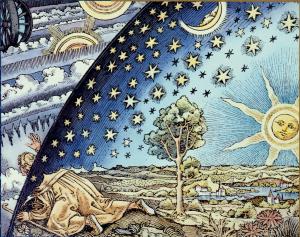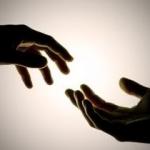As it happens, today, the 8th of October, 1582, never happened. At least this day never happened in Poland, Portugal, or Spain. It was part of the general corrections that were implemented with the new Gregorian calendar.
While calendars and what they mean and do not is certainly worthy of some reflection, as a dutiful Zen person the thing that most captures my heart is the no-thing, the day that did not happen.
Of late I’ve found myself thinking of that delicious word lacuna. Merriam-Webster tells us a lacuna is an unfilled space or interval or gap. It can be a missing portion in a book or manuscript. Also it has an anatomical reference, it can be a cavity or depression in a bone.
It appears to derive from the Latin for a lake. Something I find I delight in. And appears to enter the English language in that anatomical use around 1700. Lacuna then proceeded to mutate and become this reference to a missing part, especially in a manuscript not long after.
Which takes us to Zen.
Zen’s awakening is predicated upon two truths.
The one is acknowledging this world within which we exist. While images and metaphors are used that can confuse the inquirer, simply and plainly put this world is not a dream or a mirage. However, the things of this world, every blessed one of them, all pass away. We all birth, live, and die. Sometimes in a moment. Sometimes after incredibly long periods of time. But, everything passes away.
The other truth is nothing contains some abiding substance that survives that disruption which is death. Rather the things of the world are moments created by encounters with other moments, expressed in some mysterious dance of existence. It is not unlike that image of a lake. It is mysterious. It is deep. It is dark. It gives life. And it kills.
We, you and I, are born with a particular terrible and beautiful ability. While we are completely caught up in the flow of life and death and the play of unimaginable multiple causes and effects, we are also gifted with some magical ability to see ourselves in our momentariness, to know the play of it all in the sense of some deep heart wisdom. Our healing, our freedom comes with this discovery not as an idea but as a living reality.
A problem I’ve seen among Zen people sometimes is a romancing of the nothing, making the missing piece what it is all about.
So, for instance, I’ve watched this missing part be treated as a magic box. Here someone wants something, let’s say a second piece of cake. Drop that cake into the magic box. And cake and calories and weight and consequences all collapse. There is at the moment only nothing. Then, when you pull it out of the magic box, lo and behold, what’s the problem with a second slice of cake. It’s all one. It’s all empty. This of course is a silly example. But people do it to justify just about anything. Some of it not silly at all, only hurtful and sad.
Others take that nothing as a step away from this world. Or, at least as an invitation to something otherworldly. Here people use the great empty to hide from life. Except of course life proceeds on whether we’re attending to it or not. In the sense of the empty there is no time. But, in the sense of our personal existence, it proceeds in one direction from birth to death.
So, the great empty can be a place to throw away meaning and to salve the ego. Such is the power of things that don’t exist. So, a couple of cautions. Trying to live in the great empty is a mistake. It is always a part of the truth of our existence. But, we don’t live there anymore than a monkey can live in that lake.
Rather the invitation for us all is into the dance of being. The nothing that is at the heart of our existence is in fact the stuff of our existence. It is one dynamic arising and falling. It is a dance. We find in that ancient metaphor we are like waves on the surface of that lake. We rise, we fall. But don’t cling too tightly to the image. It is only a pointer.
And with that we don’t see this reality straight on. We do not learn the mystery by thinking our way through. That thinking thing is important. For us as humans among the most important. But, it does not lead us to wisdom. It does not take us to stand in the place where the missing and the manifest arises.
And so there are the many ways. One of which is the Zen way. And on our Zen path we’re invited into an oblique way. Wisdom arises as we notice the missing parts. Out of the corner of an eye. On the moment when the breath moves from in to out. As we watch a child play. As we cook some eggs. When we have a heart attack. Let it arise, and let it go.
And for us the key is to first notice the part that isn’t there. The invitation for us on the great Zen way is to notice the missing day, to notice the missing word or phrase in the manuscript, to notice. Like the flock of parrots that just flew by. Now squawking merrily. And, now gone. Just notice. The thing. The missing.
Don’t get trapped in grasping. Don’t get trapped in letting go.
It’s a dance.
Realize this and not only are human hearts put to ease, but we discover our place in the family of things.














